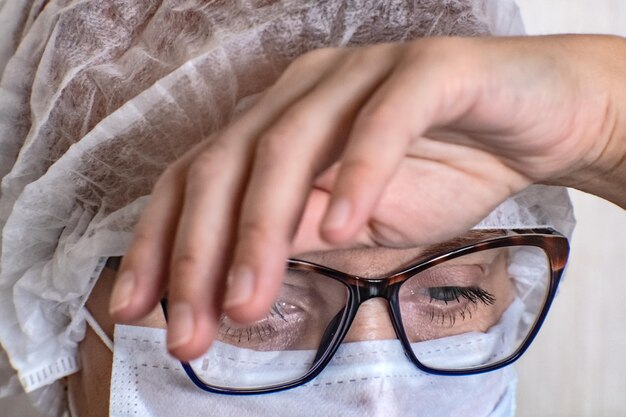Your Guide to How Long Is Recovery From Cataract Surgery
What You Get:
Free Guide
Free, helpful information about Cataract FAQ and related How Long Is Recovery From Cataract Surgery topics.
Helpful Information
Get clear and easy-to-understand details about How Long Is Recovery From Cataract Surgery topics and resources.
Personalized Offers
Answer a few optional questions to receive offers or information related to Cataract FAQ. The survey is optional and not required to access your free guide.
What to Expect: Recovery from Cataract Surgery
Embarking on the journey to address cataracts often comes with a mix of relief and curiosity, especially when it comes to the post-operative recovery period. Cataract surgery is a common outpatient procedure designed to restore clear vision by removing the eye's clouded lens and replacing it with an artificial one. Understanding the recovery timeline can help you manage expectations and facilitate a smooth healing process. Below is a comprehensive guide on what to expect, potential challenges, and tips for a successful recovery.
Understanding Cataract Surgery and Initial Recovery
Cataract surgery is typically a brief procedure, often completed in under an hour. It boasts a high success rate, with patients usually experiencing significant improvement in vision. Here's what the initial recovery phase generally looks like:
Immediate Post-Operative Care
- Rest in a Recovery Area: After the procedure, patients are monitored in a recovery area until they are stable enough to go home.
- Protecting Your Eye: A protective shield may be placed over your eye to prevent accidental rubbing that could disrupt the healing process.
- Transportation Arrangements: Due to the lingering effects of sedation or anesthesia, arranging for someone to drive you home is essential.
First Few Days After Surgery
- Gradual Vision Improvement: Many individuals notice clearer vision within a few days, although this can vary.
- Mild Discomfort: Some slight irritation or a scratchy sensation is normal. Avoid touching or rubbing your eye.
- Follow Physician Guidelines: Using prescribed eye drops to prevent infection and inflammation is crucial during this time.
Week Two to Month One: Continued Healing and Expectations
As you transition from the initial phase of recovery, your focus shifts to longer-term healing. Here’s what typically occurs during weeks two through four:
Vision Stabilization
- Adjustments and Clarity: Although you might gain improved vision rapidly, fine-tuning and stabilization can take several weeks.
- Possible Visual Aberrations: Some individuals experience glare or halos, especially around lights, which usually diminish over time.
Routine Daily Activities
- Resumption of Normal Activities: Most people return to gentle activities within the first week. However, your doctor may advise restrictions on strenuous exercises or exposure to environments that could introduce contaminants to the eye.
- Protective Measures: Continuing to use eye shields at night and sunglasses during the day helps safeguard your healing eye from irritants.
Monitoring and Follow-Up
- Scheduled Doctor Visits: Follow-up appointments are vital to ensure your eye is healing correctly and to address any emerging concerns.
Long-term Recovery: Fine-Tuning and Care
Approaching two to three months post-surgery, most patients report restored functionality and satisfaction with their vision. Some considerations and actions during this phase include:
Achieving Optimal Vision
- Prescription Glasses: While many function without corrective lenses post-surgery, some might need glasses for specific tasks like reading or driving. Your doctor will advise you on this.
- Continuous Eye Health: Maintaining regular check-ups with your eye specialist ensures any complications are caught early.
Common Concerns and How to Address Them
Cataract surgery is generally low-risk, but being aware of possible complications equips you to seek timely medical attention if needed.
Recognizing Red Flags
- Persistent Discomfort: Extended pain or swelling may indicate infection or another issue.
- Vision Changes: Any rapid deterioration in vision should prompt a call to your eye care provider.
- Light Sensitivity: Increased sensitivity beyond the initial weeks should also be evaluated.
Tips for Smooth Recovery
- Maintain Good Hygiene: Always wash your hands before touching your eye or administering eye drops.
- Avoid Irritants: Avoid swimming pools, hot tubs, and environments with high levels of dust or pollen as these can irritate the healing eye.
- Dietary Considerations: A balanced diet and proper hydration support overall well-being and eye health.
Navigating Recovery: A Quick Reference Guide
Here’s a handy checklist to help manage your recovery with ease:
🌟 Key Tips for Recovery
- 🕶️ Wear Protective Eye Gear: Essential for shielding your eye during sleep and outdoor activities.
- 💧 Follow Eye Drop Instructions: Consistent use is vital for preventing infections.
- 🚶♂️ Resume Activities Gradually: Adapt to your energy levels and avoid heavy lifting.
- 📅 Stick to Follow-up Schedule: Prompt detection of any complications can help prevent long-term issues.
- 🚫 No Rubbing Your Eye: Essential to prevent disruption of the healing process.
Building a Recovery Routine
Successfully navigating the recovery from cataract surgery involves balancing timely medical follow-up with self-care practices. By focusing on both physical healing and lifestyle adjustments, you can enhance your recovery experience and return to seeing the world more clearly.
Through understanding the stages of recovery, recognizing potential challenges, and following doctor-recommended practices, you are well-equipped to embark on this transformative journey toward improved vision. Remember, while this guide provides general insights, always defer to personalized advice from your healthcare provider regarding your specific situation.
What You Get:
Free Cataract FAQ Guide
Free, helpful information about How Long Is Recovery From Cataract Surgery and related resources.

Helpful Information
Get clear, easy-to-understand details about How Long Is Recovery From Cataract Surgery topics.

Optional Personalized Offers
Answer a few optional questions to see offers or information related to Cataract FAQ. Participation is not required to get your free guide.


